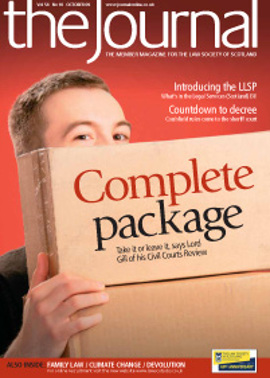Defining the future

In a week that involved a host of announcements – members’ approval of a £100 reduction in the practising certificate, release of the Scottish Legal Aid Board’s annual report, and confirmation of the remit for a review of rights of audience – there was always a possibility that publication of the Legal Services (Scotland) Bill would be overshadowed by other events. As it turned out, the bill was quietly introduced to the Scottish Parliament on 30 September and published the following day, avoiding a clash with yet another important announcement – the findings of Lord Gill’s review of the Scottish civil court system.
Perhaps the lack of attention reflected the fact that publication of the bill followed a lengthy public debate. And it is fair to say that the legislation contains few major surprises, while also generally meeting the policy of both the Society and the Scottish Government. For instance, there will be no Legal Services Board, as exists in England & Wales.
Choice of model
In headline terms, the bill sets out its guiding principles as “provisions relating to regulatory objectives”. In other words, the legislation sets out the duties those involved with ABS will have to comply with to support the rule of law, promote the independence of the legal profession, promote access to justice and promote the interests of consumers and the public. Professionals providing legal services under the bill are required to support the proper administration of justice, act with independence and integrity, provide good quality of work, act in the best interests of clients, and comply with court and professional practice rules.
The detail of the bill considers the rules for new entities providing legal advice and representation to the public for a fee – called licensed legal services providers (LLSPs), rather than alternative business structures – as well as those under which approved regulators would operate. While the change in terminology may involve some adjustment, it is intended to show that LLSPs and solicitors are performing the same functions, the latter with a practising certificate as his or her “licence”. The traditional structure is unaffected, which may be of some comfort to those who do not want to change the way their firm operates. The alternative models under the bill include setting up in business with non-lawyers, other professionals and allowing non-lawyers to own entities providing legal services.
Each of the new entities would need to appoint a head of legal services and either a head of practice or a practice committee (though the head of legal services can be the same person as the head of practice). These are effectively the compliance officers, who must ensure that the entity acts in line with the licensing and practice rules, reporting suspected breaches to the approved regulator.
The Society (and other regulators)
The bill allows for any body to become an approved regulator, providing it puts forward a scheme that shows it will be capable, competent, independent, and have sufficient resources to carry out its functions. The possibility exists for multiple regulators, such as the Society along with others. For instance, the Institute of Chartered Accountants in Scotland has already expressed an interest. Others may yet do likewise. In theory, a body could be set up specifically to operate as a regulator under the legislation, though there has been no indication that this is likely. Approved regulators will have to provide a mechanism for resolving regulatory conflict.
Becoming an approved regulator is likely to be complex, with costs that are difficult to quantify, and will not be undertaken lightly. Successful applicants will set the licensing and practice rules for LLSPs and inspect the accounts of entities at least every three years. Schemes for regulation will have to take access to justice into account.
The Society must make a number of changes to its governance arrangements under the bill. Significantly, a proportion of Council has to be made up of non-lawyers. In response, the Society has put forward a figure of around 20%, which is understood to be broadly acceptable to ministers. The bill will also contain provisions about establishing a regulatory committee which has 50% non-lawyer membership and a lay convener, which is in line with current regulatory practices. The committee will oversee the regulatory functions of the Society, though Council will remain the governing body.
The role of the Lord President in the new regulatory structure is also considered in the bill. This gives the Society some cause for concern. In a departure from the consultation, the Lord President only needs to be consulted over the approval of regulators; his consent is not mandatory. Clearly, the appointment of a regulator by ministers would raise questions about independence from Government. Having the Lord President’s consent as a prerequisite is an important constitutional safeguard. The same considerations apply when considering the decommissioning of an approved regulator.
Opportunities
The Society has driven forward the debate on reforming legal services to ensure the solicitors’ profession is best able to meet the needs of modern society and a global economy. We will continue to work constructively with the Scottish Government and Parliament and other interested parties, raising issues of concern and offering constructive criticism. In doing so, we hope to help produce an effective and economical framework that provides proper regulation, respects the public interest and safeguards access to justice. In turn, firms will be offered a fresh opportunity to innovate while retaining the best traditions of the Scottish legal profession.
What are legal services?
Section 3 of the bill defines “legal services” for the purposes of the Act as “services which consist of (at least one of) –
(a) the provision of legal advice or assistance in connection with – (i) any contract, deed, writ, will or other legal document, (ii) the application of the law, or (iii) any form of resolution of legal disputes, or
(b) the provision of legal representation in connection with – (i) the application of the law, or (ii) any form of resolution of legal disputes”. Judicial activities, and quasi-judicial activities such as mediation, are excluded.
By s 36(2) an entity is eligible to be a licensed legal services provider “only if it has within it, for the provision of legal services, at least one solicitor who holds a practising certificate that is free of conditions (as construed by reference to section 15(1) of the [Solicitors (Scotland) Act 1980])”.
Comment: Non-lawyer voice must be heard
Effective competition, subject to appropriate safeguards, is clearly in the consumer interest. It increases choice, lowers prices and encourages service providers to compete for customers by offering superior services to their competitors. The Legal Services BiIl paves the way to open up competition in the market and widen choice for users of legal services. We anticipate that new ways to improve access to justice and expert legal advice will develop as a result of the bill.
The proposed changes to the Law Society of Scotland’s governance structures are overdue. The Society has a dual role to protect the interests of its members and promote the public interest. Until now, this dual role has not been reflected in the membership of its governing structure, and has weakened the Society’s authority and influence. While we welcome the proposal that 50% of its regulatory committee members should be non-solicitors, we believe this should also extend to its Council.
We are disappointed that the bill does not introduce an advisory panel to advise ministers on applications for authorisation and keep the regulatory framework under review. We believe that such a non-lawyer panel is necessary, given the potential for a regulatory body to have multiple responsibilities for regulating licensed legal services providers and individual professionals, while promoting the interests of the public and the profession.
Comment: Society must move fast
The publication of the bill creates a once-in-a-generation opportunity for Scottish law firms. It is now for our own Law Society to put itself rapidly into a position to become an approved regulator so that licensed providers can be up and running as quickly as possible. This is not a time for delay or prevarication.
What is important is that we should be given the opportunity, if we want to take it, to reposition ourselves, to take a leap forward, to become providers of multi-disciplinary services – legal services of course at the heart of what we do, but also other services such as tax compliance and tax advisory work, pensions and retirement planning, financial planning and investment management.
If you want to provide these other services at the same level as you provide existing legal services, you need appropriately skilled people providing top-level advice in these different disciplines. You cannot attract and retain people at the right level if there is a glass or even concrete ceiling and they do not have the possibility of becoming full partners in the firm.
It would be a curious paradox if a new ABS framework allowed third parties to own a stake in a law firm but did not allow senior client-facing advisers – who happened to be non-lawyers – to have a seat at the partnership table.
Now that the legislative framework is available, our Society should move rapidly to take the lead role in creating the necessary regulatory framework.
In this issue
- The Combined Standard Clauses (2009 edition)
- Preserving a legal inheritance: settlement rights in the "Occupied Palestinian Territories"
- The European Court and the duty to investigate deaths
- Chief Executive's SGM address
- Shelter's online resources
- Musical copyright and contract
- The international swap shop
- Headline fortnight
- The Gill Report? What's not to like?
- Solicitor advocates and conflicts of interest
- Settlement in the West Bank
- Package deal
- RoS = economic value
- Defining the future
- Global leader?
- Dog's chance
- Coulsfield rules OK
- Money and your life
- Experts on the case
- At the hub, 10 years on
- Guardians: don't look to the Fund
- From the Brussels office
- Ask Ash
- Making the most of ABS
- Planning for growth
- The perils of posting
- ARTL: friend or foe?
- Where privacy prevails
- How was it for you?
- Agreeing rescues with creditors
- Adopting new solutions
- Divorce for gender change
- Scottish Solicitors' Discipline Tribunal
- Book reviews
- Website review
- A safe pair of hands tops the bill
- Law out of step






